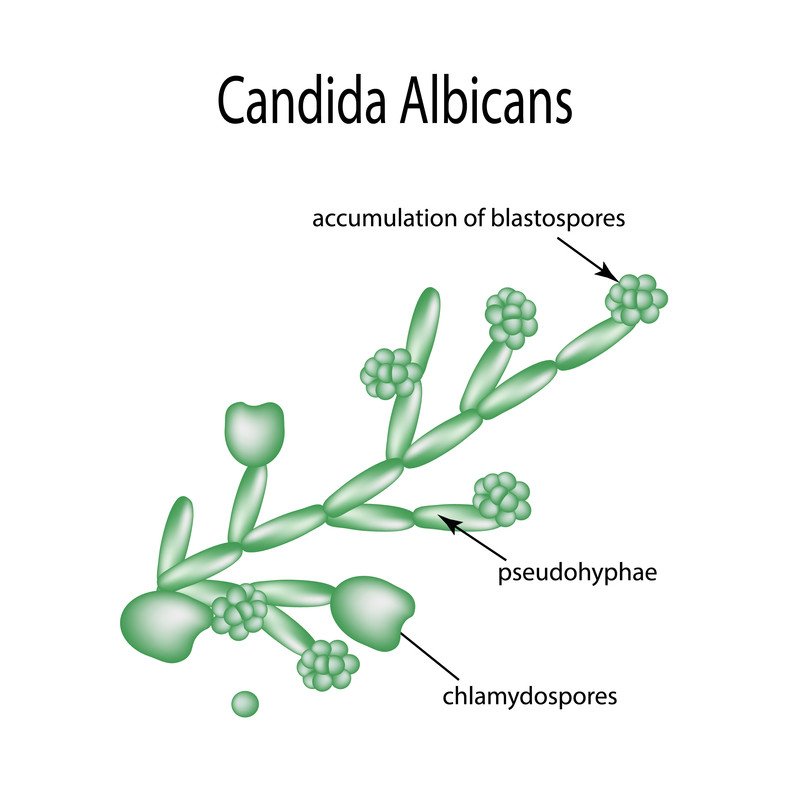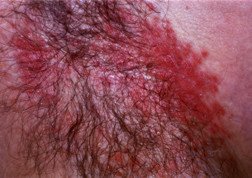Candidiasis
Medically reviewed by Drugs.com. Last updated on Feb 8, 2024.
What is candidiasis?

Candidiasis is an infection caused by Candida fungi, most often by Candida albicans. These fungi are found almost everywhere in the environment. Some may live harmlessly along with the abundant "native" species of bacteria that normally colonize the mouth, gastrointestinal tract and vagina.
Usually, Candida is kept under control by the native bacteria and by the body's immune defenses. If the mix of native bacteria is changed by antibiotics or the body moisture that surrounds native bacteria undergoes changes in its acidity or chemistry, it can allow yeast to thrive and cause symptoms.
Candidiasis can affect many parts of the body, causing localized infections or larger illness, depending on the person and his or her general health.
Candida infections can cause symptoms in healthy people. Usually the yeast infections are limited to the mouth, genital area or skin. However, people with a weakened system from illness or medications such as corticosteroids or anticancer drugs are not only more susceptible to topical infections, they also are more likely to experience a more serious internal infection.
|
|
Places on and in the body that may be affected by candidiasis include:
- Thrush — Thrush is the common name for a mouth infection caused by the Candida albicans fungus. It affects moist surfaces around the lips, inside the cheeks, and on the tongue and palate.
- Esophagitis — Candida infections of the mouth can spread to the esophagus, causing esophagitis.
- Cutaneous (skin) candidiasis — Candida can cause skin infections, including diaper rash, in areas of skin that receive little ventilation and are unusually moist. Some common sites include the diaper area; the hands of people who routinely wear rubber gloves; the rim of skin at the base of the fingernail, especially for hands that are exposed to moisture; areas around the groin and in the crease of the buttocks; and the skin folds under large breasts.
- Vaginal yeast infections — Vaginal yeast infections are not usually transmitted sexually. During a lifetime, 75% of all women are likely to have at least one vaginal Candida infection, and up to 45% have 2 or more. Women may be more susceptible to vaginal yeast infections if they are pregnant or have diabetes. The use of antibiotics or birth control pills can promote yeast infections. So can frequent douching.
- Deep candidiasis (for example, candida sepsis) — In deep candidiasis, Candida fungi contaminate the bloodstream and spread throughout the body, causing severe infection. This is especially common in newborns with very low birth weights and in people with severely weakened immune systems from illness or medications such as anticancer drugs. In these people, Candida fungi may get into the bloodstream through skin catheters, tracheostomy sites, ventilation tubing, or surgical wounds. Deep candidiasis also can occur in healthy people if Candida fungi enter the blood through intravenous drug abuse, severe burns or wounds caused by trauma.
Symptoms of candidiasis
Candidiasis causes different symptoms, depending on the site of infection.
- Thrush — Thrush causes curd-like white patches inside the mouth, especially on the tongue and palate and around the lips. If you try to scrape off this whitish surface, you will usually find a red, inflamed area, which may bleed slightly. There may be cracked, red, moist areas of skin at the corners of the mouth. Sometimes thrush patches are painful, but often they are not.
- Esophagitis — Candida esophagitis may make swallowing difficult or painful, and it may cause chest pain behind the breastbone (sternum).
- Cutaneous candidiasis — Cutaneous candidiasis causes patches of red, moist, weepy skin, sometimes with small pustules nearby.
|
|
- Vaginal yeast infections — Vaginal yeast infections may cause the following symptoms: vaginal itch and/or soreness; a thick vaginal discharge with a texture like soft or cottage cheese; a burning discomfort around the vaginal opening, especially if urine touches the area; and pain or discomfort during sexual intercourse.
- Deep candidiasis — When Candida spreads to the bloodstream, it may cause a wide range of symptoms, from unexplained fever to shock and multiple organ failure.
Diagnosing candidiasis
Your doctor will want details about your medical history. He or she also will ask about your diet and about your recent use of antibiotics or medications that can suppress the immune system. If your doctor suspects cutaneous candidiasis, he or she may ask how you care for your skin and about conditions that expose your skin to excessive moisture.
Often, your doctor can diagnose thrush, cutaneous candidiasis, or vaginal yeast infection by a simple physical examination. However, if the diagnosis is uncertain, your doctor may obtain a sample by gently scraping the involved surface to examine under a microscope or may send it for culture. A culture is especially helpful if you have a yeast infection that returns after treatment. In this case, the culture can help identify whether the yeast is resistant to usual antifungal therapy. If your doctor suspects that you have an undiagnosed medical illness that increases your risk of candidiasis — such as diabetes, cancer or HIV — blood tests or other procedures may be necessary.
To diagnose Candida esophagitis, your doctor may to need to refer you to a specialist who can examine your esophagus with an endoscope, a flexible instrument that is inserted into your throat and allows the doctor to look at the area directly. During this examination, called endoscopy, the doctor will take a sample of tissue (either a biopsy or a "brushing") from your esophagus to be examined in a laboratory.
To diagnose deep candidiasis, your doctor will draw a sample of blood to be checked in a laboratory for the growth of Candida fungi or other infectious agents.
Treatment options
The following list of medications are related to or used in the treatment of this condition.
Expected duration of candidiasis
In otherwise healthy people who have thrush, cutaneous candidiasis, or vaginal yeast infections, Candida infections usually can be eliminated with a short treatment (sometimes a single dose) of antifungal medication. However, in people with AIDS or other diseases that weaken the immune system, Candida infections can be difficult to treat and can return after treatment. In people with weakened immune systems, candidiasis can be life threatening if it passes into the blood and spreads to vital organs.
Preventing candidiasis
In general, you can prevent most Candida infections by keeping your skin clean and dry, by using antibiotics only as your doctor directs, and by following a healthy lifestyle, including proper nutrition. People with diabetes should try to keep their blood sugar under tight control.
Treating candidiasis
Treatment of candidiasis varies, depending on the area affected:
- Thrush — Doctors treat thrush with topical, antifungal medications such as nystatin (Mycostatin and others) and clotrimazole. For mild cases, a liquid version of nystatin can be swished in the mouth and swallowed, or a clotrimazole lozenge can be dissolved in the mouth. For more severe cases, an antifungal drug such as fluconazole (Diflucan) can be taken once a day by mouth.
- Esophagitis — Candida esophagitis is treated with an oral antifungal drug such as fluconazole.
- Cutaneous candidiasis — This skin infection can be effectively treated with a variety of antifungal powders and creams. The affected area must be kept clean and dry and protected from chafing.
- Vaginal yeast infections — Vaginal yeast infections can be treated with antifungal medications that are applied directly into the vagina as tablets, creams, ointments or suppositories. These include butoconazole (Femstat), clotrimazole (Gyne-Lotrimin), miconazole (Monistat, Vagistat and others), nystatin (Mycostatin and others), and tioconazole (Monistat-1, Vagistat-1). A single dose of oral fluconazole can be used. Sex partners usually do not need to be treated.
- Deep candidiasis — This infection usually starts with an intravenous anti-fungal drug, such as voriconazole or fluconazole. People with very low white blood cell counts may need an alternative intravenous antifungal drug, such as caspofungin or micafungin.
When to call a professional
Women that are otherwise healthy can self-treat for simple candida vaginitis. Call your doctor if it persists despite topical therapy or it recurs soon after treatment.
For other symptoms that may be caused a candida infection, contact your doctor for advice.
Prognosis
Typically, in otherwise healthy people with superficial candidiasis, a properly treated infection goes away without leaving permanent damage. Superficial candidiasis may take longer to treat and is more likely to recur in people that need long courses of antibiotics.
In people with chronic illnesses or weakened immune systems, episodes of candidiasis may be more resistant to treatment and may return after treatment ends. In people with deep candidiasis, those who are diagnosed quickly and treated effectively have the best prognosis, especially if their infection can be stopped before it spreads to major organs.
Additional info
Centers for Disease Control and Prevention (CDC)
https://www.cdc.gov/
Further information
Always consult your healthcare provider to ensure the information displayed on this page applies to your personal circumstances.


